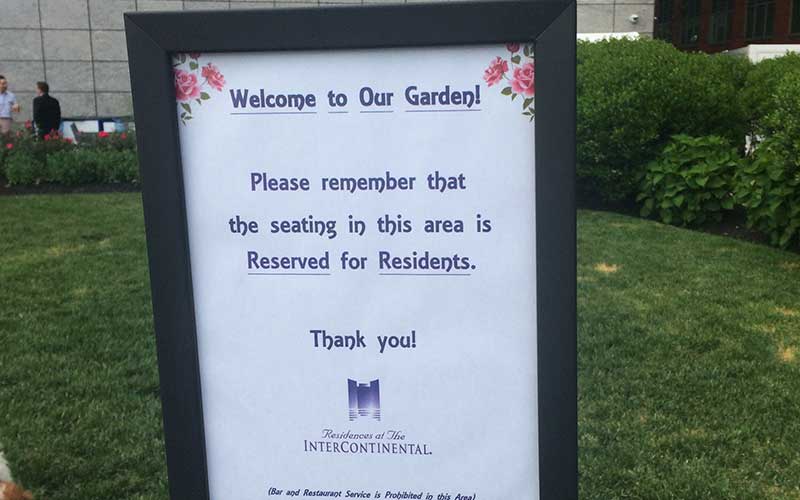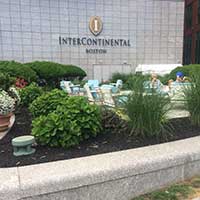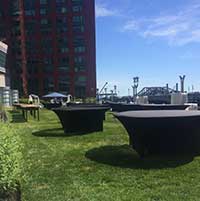
The Intercontinental Hotel is violating the law by restricting access to public spaces.
This week, the City of Boston proclaimed its dedication to working with developers to create public spaces in the midst of its new construction boom – and ensuring that those spaces are kept public and welcoming. The next day, the Intercontinental Hotel at 500 Atlantic Avenue received a notice from the Massachusetts Department of Environmental Protection (MassDEP) for failing to do just that.
Public Access Required
Located along the Boston waterfront, the property, which is occupied by the hotel and luxury condos, was required to get what’s called a state Waterways License when it was going through its pre-development permitting and licensing back in 2005. That license allowed them to build a “non-water dependent use” on tidelands – meaning, their business isn’t dependent on having access to the water like, say, a fishing pier would be.
The catch? Among other requirements, the developer was required to provide public spaces outside that you, me, and everyone else in the city could access 24 hours a day, 7 days a week, free of charge. The developer’s original plans envisioned a generous harborwalk bordered by landscaping, public lawn areas, a fountain, and a public plaza. But over time the hotel and condominium operations slowly encroached into these spaces and privatized them.
The Intercontinental Is Denying the Public Its Rights

Today, the area that was envisioned to be a plaza is used for outdoor dining for the hotel’s restaurant patrons. The harborwalk-side of the plaza is lined with large potted plants – signaling to passersby that if they want to sit there they must loop around the lawn and instead enter the plaza on the building side, where they are greeted by a maître d’.
The site features two lawn areas, both of which are supposed to be open to the public. The smaller of the two lawns beckons with cushy lawn chairs and tables, but a sign at its entrance warns that it is for the exclusive use of the condominium residents. The larger of the two lawns boasts no such amenities, but it is routinely rented out by the hotel for private events. CLF staff even went into investigative-mode and made inquiries at the hotel about fees for renting the lawn. We were told that the rental price for the lawn (not including food and drink services) could be as much as $2,000 for four hours. Even when private events are not being held there, it is unclear to the average person whether they can use the lawn or if it is private property.
Bringing the Intercontinental Into Compliance with the Law

To reiterate, all of these spaces are legally open to the public and the Intercontinental is violating its Waterways license by restricting their use. While they aren’t the only waterfront tenants doing so, what’s so astonishing in this case is the scale of their violations.
Fortunately, after being alerted to the illegal activity, MassDEP sent an enforcement notice to Extell Boston Harbor, LLC (the licensee of the site). The letter stated that Extell has 30 days to remove anything that currently restricts pedestrian access, including the restaurant seating, and to make sure this area is open and unrestricted to the public 24 hours a day.
Did the City Turn a Blind Eye?
It’s a travesty that the illegal operations on this site have gone on for as long as they have, but CLF appreciates the swift and firm action taken by MassDEP once they were alerted to the violations. We understand that the Department simply doesn’t have the time and resources to police every single property licensed under the Waterways program up and down the Massachusetts shoreline. What is questionable is why the City of Boston didn’t notice this activity happening under its nose for so long.
The Boston Planning and Development Agency was heavily involved in the redevelopment of this site and surely knew the restrictions that were placed on the public areas. You might argue that it isn’t their job to oversee sites like this where enforcement ultimately falls on the state. But if city leaders are as committed as they claim to ensuring that public spaces are accessible and welcoming, shouldn’t they be paying attention?
To read the letter that CLF sent to MassDEP outlining the full range of license violations on this site click here (pictures included!).



